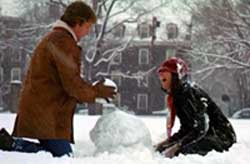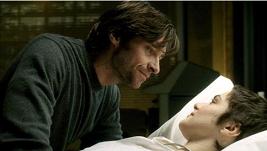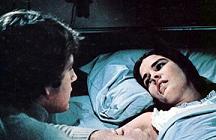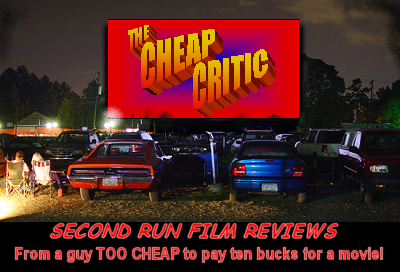
Children of Men is an astoundingly good film... in almost every way. The acting, direction, cinematography, pacing, editing and visual style are all top notch. The film is a textbook example of how to use a camera to tell a story. I could go on for hours singing the technical merits of the film and still not do it justice. My readers are hereby commanded to immediately go out and see it, those who haven't already, because my readers deserve the finest the cinema can offer... and because I am curious how many of you will have the same problem I had with the film -- the constant indecision you feel as a viewer, about whether to rise above the rather flabby writing, or to go ahead and let it bother you.
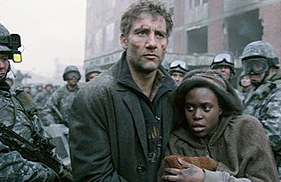
Children of Men
The easiest way to explain my problem with the film is to ask you to perform a small thought experiment. Please imagine that the "Chairman" on Iron Chef America develops a case of Obsessive Compulsive Disorder and becomes obsessed with broccoli. Every week when the chest opens to reveal the secret ingredient it is the same thing: broccoli. Week after week, season after season: broccoli.
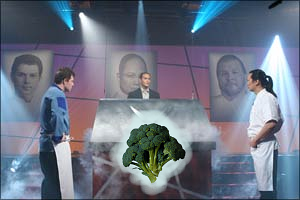
Battle Broccoli #248
Now there is nothing wrong with broccoli; it is a very healthy, wholesome food -- high in fiber and vitamins, and low in fat -- but it also has a strong distinctive flavor and after a while one could get tired of it. The Iron Chefs may be mighty men of culinary science but after a while even they might start to run out of ways to feature broccoli.
That is more or less the problem I find myself confronting every time I go to the movies these days. The secret ingredient is almost always the same. The "Ominous Parallels" between post-9/11 western societies and Germany between the wars is an interesting enough notion, and one you could do well to explore in a film or two, but it is not an interesting enough idea to serve as the basis for all of the movies coming out of Hollywood year after year.
To be fair, while I do tend to like broccoli when nicely prepared, with the "Ominous Parallels," not so much. I thought Leonard Peikoff overtaxed the notion in his book by that title a quarter of a century ago and I find the most recent resurgence of the concept among the trendy, anti-war left even more annoying.
Alfonso Cuarón is clearly an extremely talented filmmaker and if anyone could make P.D. James’ novel fit into the marxist mythos of Ominous Parellels he is the one. But he couldn't quite accomplish it and arrive at the end with a film that makes any sense. Some people I know (the Teleodaughter, for one) very much admire the book and are rather cross at Cuarón for trying. Me, I haven't read the book so all I noticed was that the film is ultimately hollow at the core -- but Hot Damn! what a surface it's got!
For other views of the film, both better written than mine, I recommend these reviews: Don't blame me for 'Children of Men' by Mark Steyn and Children of Men Gets It All Wrong by my friend, Bill.
So, in conclusion: Iron Filmmaker, Cuarón has labored mightily to produce Children of Broccoli but I say it's spinach and I say the Hell with it!




